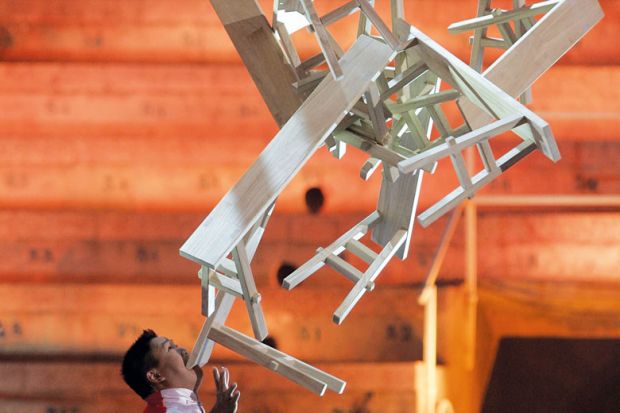Several Chinese universities have launched weekend “micromajor” courses in the hope of giving their students the edge in an increasingly competitive job market.
Among the institutions launching short courses to complement undergraduate degree programmes are Guangdong University of Technology, which is encouraging civil engineering students to take micromajors in fields such as artificial intelligence and machinery automation, and Hunan University of Technology and Business, which lists micromajors in areas including green financial technology, metaverse technology and digital carbon neutrality.
Both institutions announced the initiatives in May, with Beijing Union University, the Communication University of China and Wuhan University of Science and Technology among others to announce similar initiatives in recent months.
Based on public course information, at least three of these institutions – the Communication University of China, Guangdong University of Technology and Wuhan University of Science and Technology – timetable their micromajors for weekends.
He Jianian, deputy dean of Guangdong’s School of Civil and Transportation Engineering, described micromajors as a “flexible talent development plan”, differing from a minor or second degree programme.
“It combines three to seven core courses in a specific area, allowing students to quickly gain a deep and comprehensive understanding about its latest technological developments,” he said.
At Guangdong, students are eligible to apply for the additional courses if they pass all their modules in the first semester. If their application is successful, students will study for their main major on weekdays and the micromajor at weekends, receiving a certificate at the end of the programme.
The annual intake of about 50 students represents around 10 per cent of the school’s total cohort.
“As far as we know, students are motivated to make use of their weekends to study more about AI, big data and automation, which they consider meaningful,” Dr He said. “But we do keep regular communication with them to make sure they have study-and-life balance.”
Employability is a key driver. With unprecedented numbers of university leavers entering the job market – the annual graduate cohort is set to pass 10 million – Chinese institutions are under intense pressure to improve graduate employment rates.
Dr He suggested that micromajors could give his top graduates the edge.
“There is a growing demand in the civil engineering sector for ‘compound talents’ who have construction knowledge as well as [expertise in] advanced technologies like automation, robotics, computer science and artificial intelligence,” he said.
Davy Cheng, founding dean of the School of Medicine at the Chinese University of Hong Kong’s Shenzhen campus, said there was a broader drive to equip graduates with a wider range of perspectives, drawing in the case of his department on fields such as artificial intelligence, biomedical engineering and healthcare economics.
“The traditional category of subjects in the medical education system in China do need to evolve and transform; otherwise, we will not have the precise generation of physician to practise a West-meets-East medicine in the digital era,” he said.
Register to continue
Why register?
- Registration is free and only takes a moment
- Once registered, you can read 3 articles a month
- Sign up for our newsletter
Subscribe
Or subscribe for unlimited access to:
- Unlimited access to news, views, insights & reviews
- Digital editions
- Digital access to THE’s university and college rankings analysis
Already registered or a current subscriber? Login








